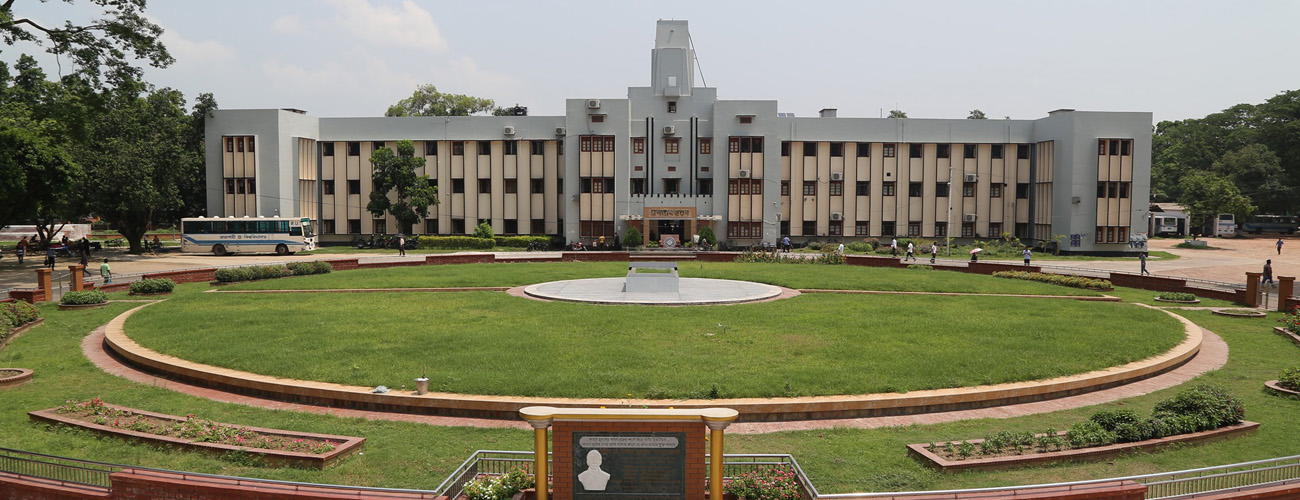Research
The department has a long tradition of research in various areas of physics under MSc, MPhil and PhD programmes. The faculty members along with their research students pursue research in diverse fields which have resulted in a large number of research publications in various journals of international repute, like Nature, Physical Review Letters, Physical Review, Nuclear Physics, Physics Letters, European Physical Journal, Journal of Materials Science, Journal of Non-Crystalline Solids, Physica Status Solidi, Journal of Physics and Chemistry of Solids, Journal of High Energy Physics, Physics and Chemistry of Glasses, Nuovo Cimento, Annals of Physics, etc. Staff of the department are also working under different international collaboration programmes with India, Japan, UK and USA.
Current research areas
- Nuclear Physics: Nuclear reaction & nuclear structure
- Radiation Physics and Medical Physics
- Atomic Physics
- Condensed Matter Physics: a) Perfect and defect crystals – computer simulation studies (theoretical). b) Solid state reaction (experimental)
- Superconductivity
- Semiconductors: Thin film deposition and characterization
- Structural properties of glass and glass ceramics
- Solar Energy
- High Energy Physics: lattice QCD
List of Publication
Physics teaching and research in the Department
From the very beginning, the Physics Department is directing its efforts towards conducting good teaching and research. Much of our teaching and research programme has been guided by the desire to understand physics at its most fundamental level.
The training of undergraduate and postgraduates is an important goal of the department. The 80-100 students trained annually, who complete the 4-year B.Sc. (Hons.) and 1-year M.Sc. Physics degree. A number of these students during their M.Sc. courses undertake project/research work to enhance their understanding of theoretical and experimental physics. Most of our graduates pursue successful careers after the training and some others pursue higher degrees abroad in prestigious institutes of the world.
The training of undergraduate and postgraduates is an important goal of the department. The 80-100 students trained annually, who complete the 4-year B.Sc. (Hons.) and 1-year M.Sc. Physics degree. A number of these students during their M.Sc. courses undertake project/research work to enhance their understanding of theoretical and experimental physics. Most of our graduates pursue successful careers after the training and some others pursue higher degrees abroad in prestigious institutes of the world.
The policy of the department is to maintain links with other institutions for collaborative work as far as possible. Over the years the department has emerged as one the leading centres for physics research in the country producing a steady stream of high quality research papers in reputed journals of the world.
Research groups
Postgraduate teaching in the Physics Department at RU follows two major streams: Solid State/Condensed Matter and Nuclear Physics. Research too is broadly categorized into these two streams. Over the years the solid state stream has expanded into areas of materials science, glass and ceramics superconductivity, as well as other areas of condensed matter physics, whereas, the nuclear stream has expanded into the areas of medical and radiation physics, atomic physics and particle physics.
The current research groups in the department can be classified as follows:
a) Solid State / Condensed Matter Physics stream
- Condensed Matter Theory
- High-Tc Superconductivity
- Materials Science (Expt.)
- Glass and Glass Ceramics
b) Nuclear Physics stream
- Nuclear Physics
- Atomic Physics
- Medical and Radiation Physics
- Particle Physics

